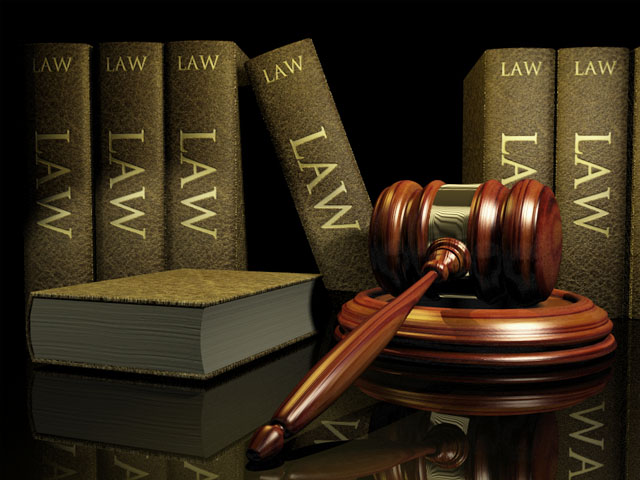Civil Law is the section of the law that deals with disputes between individuals or organisations. For example, when in a car crash a victim claims damages against the driver for loss or injury sustained in the accident, or one company sues another over a trade dispute.
Unlike criminal offences, any sentence, custodial or otherwise result usually in financial compensation. Civil law has developed in a similar way to the way criminal law has, through a mixture of statutory law made by governments, and 'precedent' which is created by earlier cases.
An example of how precedent creates law is the law of 'negligence.' In the first 'negligence' case a woman developed gastro-enteritis after swallowing a snail contained in a bottle of ginger beer. Lord Atkin, the judge who heard the case, decided that she was entitled to some form of compensation. He ruled that the manufacturer had a 'duty of care' towards its customers and in this instance had been negligent - and the law of 'negligence' was created.
Burden of proof: one crucial difference between civil and criminal law is that the 'burden of proof' is lower in a civil case. A criminal case must be proved 'beyond reasonable doubt.' A civil case only has to be proved on the 'balance of probabilities,' i.e. it is 'likely' that the defendant is guilty. Where Canada's Legal System Comes From : 1. The common-law tradition The common law, which developed in Great Britain after the Norman Conquest, was based on the decisions of judges in the royal courts. It evolved into a system of rules based
on 'precedent'. Whenever a judge makes a decision that is to be legally enforced, this decision becomes a precedent: a rule that will guide judges in making subsequent decisions in similar cases. The
common law is unique because it cannot be found in any code or body of legislation, but exists only in past decisions. At the same time, common law is flexible and adaptable to changing
circumstances. 2. The civil-law tradition The two meanings of the civil law : The term 'civil law' is used to mean two quite different things, which can be a little confusing at first for people trying to understand the justice system. Sometimes the
term is used in contrast to 'common law' to refer to the legal system that is based on a civil code, such as the Justinian Code or the Civil Code of Quebec. In its other sense, civil law refers to
matters of private law as opposed to public law, and particularly criminal law, which is concerned with harm to society at large. It is usually clear from the context which type of civil law is
intended. The Quebec Act of 1774 made Canada a 'bijural' country, one with two types of law. The Quebec Act stated that common law was to be applied outside Quebec in matters of
private law, while similar matters in Quebec were to be dealt with under Civil Code law. For public law, on the other hand, the common law was to be used in and outside Quebec. Scope of e-Court : e-Court handles civil matters common to medium size & small businesses and individuals in accordance with either the common law and/or the civil-law tradition in Canada.
e-Court shall not consider bankruptcy law, criminal matters, fiscal and administrative matters. Some areas covered by e-Court are ( not inclusive ): Is the area relative to your situation not mentioned above? Send us an email via
Canada's legal system derives from various European systems brought to this continent in the 17th and 18th centuries by explorers and colonists. Although the indigenous peoples whom the Europeans
encountered here each had their own system of laws and social controls, over the years the laws of the immigrant cultures became dominant. After the Battle of Quebec in 1759, the country fell almost
exclusively under English law. Except for Quebec, where the civil law is based on the French Code Napoleon, Canada's criminal and civil law has its basis in English common and statutory
law.
The tradition of civil law is quite different. It is based on Roman law, which had been scattered about in many places, in books, in statutes, in proclamations, until the Emperor Justinian ordered
his legal experts to consolidate all the laws into a single book to avoid confusion. Ever since, the civil law has been associated with a 'civil code'. Quebec's Civil Code, first enacted in 1866 just
before Confederation and amended periodically, was recently thoroughly revised. Like all civil codes, such as the Code Napoleon in France, it contains a comprehensive statement of rules, many of
which are framed as broad, general principles, to deal with any dispute that may arise. Unlike common-law courts, courts in a civil-law system first look to the Code, and then refer to previous
decisions for consistency.
info@e-court.ca or call the Service Desk.
e-Court handles civil cases in accordance with either the common and/or the civil-law traditions in Canada

Arbitration Law Canada
Source: HelpLineLaw on 19 May 2013

The law relating to arbitration in Canada is governed by the Arbitration Act, which came into force in the year 1995. The arbitration in its generic meaning to negotiate to resolve differences conducted by some impartial party in an amicable manner without approaching the Court. The arbitration may take place pursuant to an arbitration agreement or a clause for arbitration in a contract. The "arbitration agreement" means an agreement by which two or more persons agree to submit to arbitration a dispute that has arisen or may arise between them. In case any dispute arises between the parties they resolve the disputes pursuant to the arbitration agreement by submitting to an independent umpire to adjudicate the matter of several persons forming an Arbitral Tribunal.
If the arbitration agreement does not specify the number of arbitrators who are to form the arbitral tribunal, it shall be composed of one arbitrator.
The arbitral tribunal may also be appointed on a party's application to The Court of Queen's Bench of New Brunswick, if : If the arbitral tribunal is composed of three or more arbitrators, they shall elect a Chair from among themselves; if it is composed of two arbitrators, they may do so.
In an arbitration, the parties shall be treated equally and fairly. Each party shall be given an opportunity to present a case and to respond to the other parties' cases.
An arbitral tribunal that is composed of more than one arbitrator may delegate the determination of questions of procedure to the chair. In an arbitration, the arbitral tribunal shall admit all evidence that would be admissible in a court and may admit other evidence that it considers relevant to the issues in dispute.
The arbitral tribunal may determine the manner in which evidence is to be admitted. The arbitral tribunal shall determine the time, date and place of arbitration, taking into consideration the parties' convenience and the other circumstances of the case.
1. the arbitration agreement provides no procedure for appointing the arbitral tribunal, or 2. a person with power to appoint the arbitral tribunal has not done so after a party has given the person seven days notice to do so.
-
TOPICS:
- HOW IT WORKS
- home
- preliminary information
- introduction
- small claims court
- e-Court, how it works
- CIVIL LAW
- standard procedure
- appeal process
- hearings
- a legally binding verdict
- member of e-Court
- join e-Court
- terms, rules & regulations
- find a lawyer
- ( demo : Preliminary info )
- ( demo : The Standard Procedures )
- ( demo : The Appeal Procedures )
- OFFLINE NETWORKING
Endorsements ( 1/2000 + ):
- Miller Thomson LLP
Gerald Chipeur, QC, Partner Calgary, Alberta - Adair
Morse LLP
John Adair, Toronto, Canada Area Law Practice - Bart
Law
Jaqueline Bart, Canadian Immigration Law - Abrams &
Krochak-Lawyers
Toronto, Ontario, Law Practice - Ennis Milne - Barristers & Solicitors
Toronto, Ontario, Law Practice - Partner,
Gilbertson Davis Emerson LLP
Past President, Ontario Bar Association - George A.
Bougadis
Toronto, Ontario, Canada Law Practice - Rick
B
Calgary, Canada Area Industry Law Practice -
Patrick Cormier
Canadian Centre for Court Technology Montreal, Quebec, Canada - Jonathon Baker
Toronto, Canada Area Law Practice - Patricia M. Swerhone
Waters and Associates, Barristers & Solicitors, Toronto - Kenneth J. Byrne
Immigration and Real Estate Lawyer at Benson Buffett, Newfoundland And Labrador - Amy M. Crosbie
Partner at Curtis, Dawe, Newfoundland And Labrador - Justice Clark
Partner at Simmons Da Silva + Sinton LLP, Toronto - Stanley Potter
Owner, Stanley J. Potter, Barrister & Solicitor, Toronto - Phil Birss
Group Marketing Manager at NRL - Robert Cornish
CEO at Richter Group of Companies - Michelle Findlay
Group Marketing & Partners Director ITS Technology Group - Dyanne Fries
CEO - Design, Print and Digital Publishing - David Achim
CEO/President at SkyFiber, Inc. - Brian Adams
Manager Proposals/Business Development at Leebcor Services, LLC. - Julian Alcolea
Director de Administración Pública en Efron Consulting - Tahar Ali-Yahia
Founder, Corporate Leadership NexGedia Enterprise - Anthony Argenziano
Head of Technology eBay Enterprise - Anthony Argenziano
Head of Technology eBay Enterprise - Mike Arnold
Managing Director specializing in the logistics of Global Mobility, Records Management and 3PL across Asia Pacific. - Matteo Arru
Knowledge Management Officer European Institute of Innovation and Technology - EIT. - Victor Artemiev
Vice President (investment & business development) at Eurasian Development & Management Company - Robin Austin
Executive Strategy & Planning, Market Strategy Marketing Business Development Strategy Marketing Business - David Bagatelle
Executive Vice President and New York Metro Market President at Provident Bank New York - Stuart Bagnell
Internal Communications Manager Europe lastminute.com - PK Bala
Chief Operating Officer at Teleplan International - Joanne Dereta
Principal at Stonegate Private Counsel - Alexandre Karol Srabotnjak
Legal Services, Immigration to Canada, Ontario Small Claims, Provincial Offenses, etc. - ( Endorsements continued.....)















